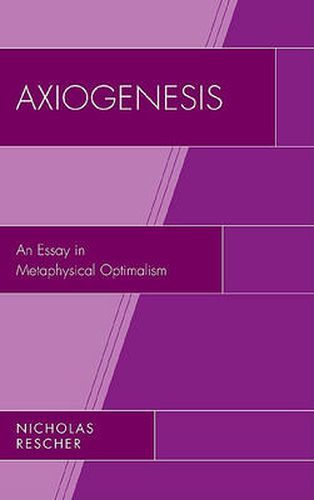Readings Newsletter
Become a Readings Member to make your shopping experience even easier.
Sign in or sign up for free!
You’re not far away from qualifying for FREE standard shipping within Australia
You’ve qualified for FREE standard shipping within Australia
The cart is loading…






Nicholas Rescher’s book Axiogenesis: An Essay in Metaphysical Optimalism is a detailed exposition of axiogenerts: the philosophical theory seeking to explain the world’s facts on the basis of evaluative considerations. In classical antiquity, this theory was espoused by Plato (in the Timaeus) and neo-Platonic tradition; in early modern times, it was revived by Leibniz and continued to find favor in the development of rational mechanics from Maupertuis to William Hamilton.
However, since then the principles behind axiogenesis and similar theories have fallen out of fashion. This book is therefore unique in that it argues in detail that this metaphysical approach still has traction and endeavors to formulate the theory in a manner that makes it available as a live option for contemporary thinkers. Advanced students of philosophy and professionals in this field, as well as anyone interested in the issue of speculative metaphysics, will find Rescher’s contemporary refashioning of axiogenesis a distinctly compelling read.
$9.00 standard shipping within Australia
FREE standard shipping within Australia for orders over $100.00
Express & International shipping calculated at checkout
Nicholas Rescher’s book Axiogenesis: An Essay in Metaphysical Optimalism is a detailed exposition of axiogenerts: the philosophical theory seeking to explain the world’s facts on the basis of evaluative considerations. In classical antiquity, this theory was espoused by Plato (in the Timaeus) and neo-Platonic tradition; in early modern times, it was revived by Leibniz and continued to find favor in the development of rational mechanics from Maupertuis to William Hamilton.
However, since then the principles behind axiogenesis and similar theories have fallen out of fashion. This book is therefore unique in that it argues in detail that this metaphysical approach still has traction and endeavors to formulate the theory in a manner that makes it available as a live option for contemporary thinkers. Advanced students of philosophy and professionals in this field, as well as anyone interested in the issue of speculative metaphysics, will find Rescher’s contemporary refashioning of axiogenesis a distinctly compelling read.